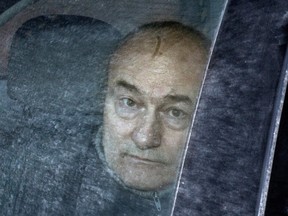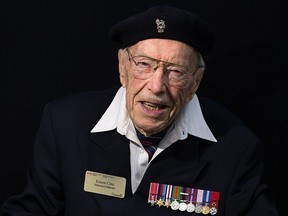Lawyers argued in the Ontario Court of Appeal that the trial judge had made an error in revisiting a prejudicial “similar fact” application during the 2017 trial.

Article content
Two days after launching an appeal in the notorious murders of three seniors in 2007, convicted killer Ian Bush is now appealing his attempted murder conviction in the violent 2014 home invasion and robbery of 101-year-old war veteran Ernest Côté.
Lawyers for Bush challenged the attempted murder conviction in a hearing Thursday before the Ontario Court of Appeal, arguing the trial judge made an error in revisiting a prejudicial “similar fact” application during the 2017 trial in the Côté case.
Advertisement 2
Article content
Article content
Bush’s legal team also argued the trial’s presiding judge, Superior Court Justice Robert Beaudoin, made an “error in principle” during his sentencing decision, when the judge handed Bush two 25-year life sentences for the attempted murder and robbery.
Bush, through lawyers Mark Halfyard and Samantha Bondoux, lodged a similar appeal before the same three-judge panel on Tuesday, when they challenged his first-degree murder convictions in the notorious killings of retired chief tax court judge Alban Garon, his wife, Raymonde, and their friend, Marie-Claire Beniskos.
Bush, 68, is serving three concurrent life sentences for the murders with no chance of parole for 25 years. During his trial, the jury heard that Bush was obsessed and enraged over a bitter tax dispute and targeted Alban Garon where he lived in a secure condominium on Riverside Drive in Ottawa.
The retired judge’s wife and their friend were killed for being in the wrong place at the wrong time. All three were found hogtied, severely beaten and suffocated to death inside their luxury condo on June 30, 2007, in a crime that shocked the city and baffled investigators for years.
Advertisement 3
Article content
Côté, a decorated Second World War veteran, was widely credited with helping police crack the cold triple-murder case.
Côté survived the 2014 home invasion after Bush robbed and terrorized him, tied his hands behind his back, taped his mouth shut, tightened a plastic bag over his head and left him to suffocate. He preserved key evidence that investigators linked to DNA from the scene of the 2007 murders. He died of unrelated causes months after the vicious attack.

The facts in both cases were so similar that the presiding judge in Bush’s triple-murder trial ruled any evidence from the Côté case could not be heard by the jury in the murder case out of fear it would prejudice them against Bush.
On Thursday, appeal lawyers argued the judge for Bush’s trial in the Côté case made an error by “revisiting” similar facts from the Garon/Beniskos murders.
Halfyard cited one passage from the 2017 ruling, stating, “No matter how the Crown attempts to sanitize or streamline its case … considering Bush’s conviction for those murders, it is not difficult to imagine that jurors would be highly prejudiced against the accused in the event the facts of the Garon murders were admitted as similar-fact evidence.”
Advertisement 4
Article content
“The jury can’t make the impermissible leap that, because he committed previous murders, he’s more likely to be lying or to have the intent (to kill Côté) in this case,” Halfyard said.
“It’s a tragic case, it’s a lengthy trial … The problem is, where there are serious errors in law, there is serious consequence,” Halfyard said.
“If this court finds the trial judge shouldn’t have revisited a similar-fact ruling, that’s not a small piece of this puzzle — that’s a big component and the Crown can’t establish that it wouldn’t have had any effect on the outcome of this trial.”
Bondoux argued the 25-year sentence Bush received was “unfit” and suggested the appellate court substitute the sentence with one in the range of 10-12 years.
Crown Counsel Greg Tweney said that point was “moot” as Bush was already serving life sentences for his other crimes, but Bondoux countered that “practical consideration” by arguing a “consideration of law.”
“If there is an error in principle that led to an unfit sentence in this case, it would justify intervention from (the Court of Appeal),” Bondoux said.
Advertisement 5
Article content
Should Bush win his other appeal and “quash” the first-degree murder convictions, Bondoux said, “That would drastically change the landscape of the sentencing appeal in this (Côté) case.”
On Tuesday, the appeal lawyers argued the presiding judge in Bush’s triple murder trial, Superior Court Justice Colin McKinnon, made an error in his assessment of the evidentiary value of a black leather bag found by police during the Côté investigation more than seven years after the murders, which contained items that had “no connection” to the 2007 crimes.
That evidence, along with the judge’s failure to properly instruct the jury about the risk of prejudice the evidence would create, “tainted” the jury’s deliberations with “impermissible reasoning,” Halfyard argued.
The three-judge panel of Justice Ian Nordheimer, Justice Steve Coroza and Justice Jonathon George reserved its decision for a later date in both appeals.
Our website is your destination for up-to-the-minute news, so make sure to bookmark our homepage and sign up for our newsletters so we can keep you informed.
Recommended from Editorial
Article content





